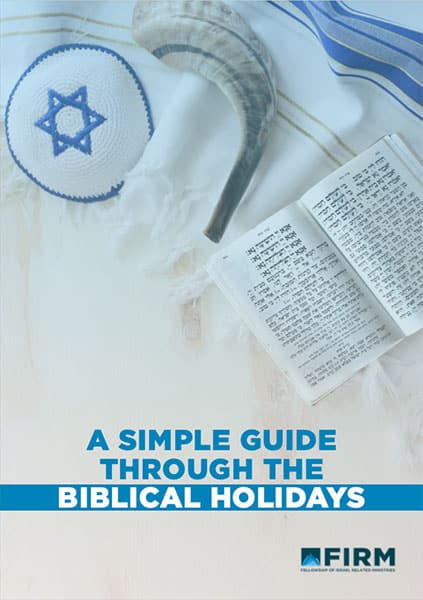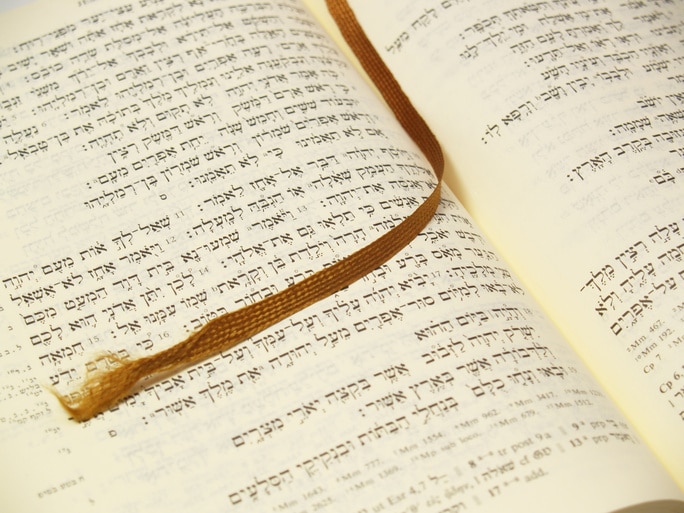Jesus in the Torah and the Old Testament
We don’t normally associate Jesus with the Torah or the Old Testament. Usually, people who desire to know Jesus and His teachings turn to the New Testament. They read the Gospels, which follow His life on earth, and then the writings of His followers.
But Jesus often pointed to the Law of Moses as the key to knowing Him.
Consider this. Reading a novel, if we miss the first several chapters, the rest of the story becomes clouded and confusing.
We may piece together the events and follow the general theme. But the real reasons for specific actions and events will remain unknown. And the same holds true with the Bible.
Do Christians need the Torah?
One of the most controversial topics in the Jewish-Christian relationships is how to view the Torah – the five books of Moses. Jews perceive it as a gift from God that they should honor. But many Christians view it as obsolete or inapplicable.
At its core, the issue comes down to a misunderstanding of what Torah means. Every language is deeply rooted in its culture. When two different cultures use the same language, there often still are linguistic differences.
Think of British English and American English – they are almost the same. Accents aside, any English speaker will understand both without too much trouble. But the cultures have impacted even the meaning of some words that the Brits and Americans use.
These, at times, need clarification. The good news is that to learn the Biblical Hebrew culture, you do not need to be a Hebrew scholar. You need to start reading the Bible!
The Torah was intended to be “God’s culture”. Or, in other words, the way God wanted Israel to live, grow, thrive, and interact with Him. Let’s rediscover God’s character and find if there is life in the “law”.
Is Jesus Mentioned in the Old Testament?
We can understand this very important question in two ways, and I would argue that the answer to both is “Yes”.
Firstly, the Old Testament is full of prophesies about the Messiah. If you believe that Jesus, Yeshua, is the promised Son of God, then yes! Jesus is mentioned all throughout the Old Testament!
The second understanding would mean that Yeshua is actually present or directly spoken of in the Old Testament. Although the Bible does not give us a very straight answer to this, it can be argued that He was there. For more on that, I recommend the book by Asher Intrater called “Who Are Lunch with Abraham?“.
So, if Jesus is in the Torah, isn’t that something that Christians should value, too?
“If you believed Moses, you would believe me”
In John 5:46-47, Jesus gives us a key to knowing Him. He said:
If you believed Moses, you would believe Me, for he wrote about Me. But if you do not believe his writings, how will you believe My words?
If we want to know the Lord and the basis for His teachings, we need to start with what Moses wrote. If Jesus can be seen in the Torah, throughout these books, then the front of our Bibles should be worn and tattered. There would be dots of early morning coffee stains as we search for His likeness.
The most common translation of the Hebrew word Torah is “Law.” Our western concept of law is that of rigid regulations and unforgiving rules. Meanwhile, biblically, “torah” describes a parent’s loving instructions and guidance.
The Torah was given by a loving Father to Moses, to guide His children Israel in the best way for them. If Israel did not follow God’s instructions, He was not waiting to angrily squash them. God had already warned them that disobedience would be detrimental to their lives.
Likewise, today we teach our children our “personal life experience” so they can avoid life’s pitfalls. And we give them opportunity to make their own choices.
Jesus, His Teachings and the Law
As believers we want to follow the Messiah. If He’s in the Law, we want to find Him. Simply pursuing spiritual knowledge without a firm focus on the Lord will lead us to be proud. We will become self assured and religious like the Pharisees Jesus confronted.
Without the Lord, we tend to stockpile spiritual ammunition to unload on those that disagree with us. That causes greater division among us. Neither will lead us to the life that God intended.
As a Rabbi, Jesus taught the Torah first and foremost – what Moses had already instructed Israel. The Sermon on the Mount was firmly rooted in the book of Exodus. He also gave some of His teachings during the feasts found in Leviticus 23.
Jesus continued to point to the writings of Moses to prove who He was. If we do not understand the Torah, we are missing greater depths to which we can know our Messiah.
Jesus Fulfilling the Torah
When Peter asked about the signs of His return, Jesus began making parallels to events in Exodus and Numbers. The Great Commission was also the beginning fulfillment of the promise given to Abraham; that through his descendants all the nations of the earth would be blessed.
In Luke 24, it had been a discouraging week for two travelers on the road to Emmaus. The mighty prophet from Nazareth who did many wonders, who they had hoped would redeem Israel, was gone. He was betrayed, humiliated and crucified with criminals.
To add to their confusion, some women from their company were now claiming that His body was gone. Angels were declaring He was alive, but they had not seen proof of that.
How could their new travel companion have no idea of these events? And so began one of the most comprehensive teachings that Jesus gave about Himself. And look at where Jesus began:
Then beginning with Moses and with all the prophets, He explained to them the things concerning Himself in all the Scriptures. (Luke 24:27)
The Old Testament Spoke of the Messiah
Later when Jesus walked through the wall and into the room where the disciples were meeting, He reminded them again.
Now He said to them, “These are My words which I spoke to you while I was still with you, that all things which are written about Me in the Law of Moses and the Prophets and the Psalms must be fulfilled.” Then He opened their minds to understand the Scriptures.” (Luke 24:44-45)
With this understanding in mind, let’s consider other verses that use the word “Law.” What if we considered “law” to mean “God’s instructions”? Think about it while reading Psalm 119:
- The law of Your mouth is better to me than thousands of gold and silver pieces. Ps 119:72
- For Your law is my delight. Ps 119:77
- O how I love Your law! It is my meditation all the day. Ps 119:97
The Instructions for Life
Jesus said, “Do not think that I came to abolish the Law or the Prophets; I did not come to abolish but to fulfill” (Matt 5:17). After all, how could God’s Messiah abolish or reject God’s instructions on how to live without contradicting His character? Jesus and the Torah are uniquely connected!
The point of God’s instructions is to lead us to the Messiah. Paul wrote:
For Christ is the end [or goal] of the law for righteousness to everyone who believes. (Romans 10:4)
With new understanding, let’s pray Psalm 119:18: “Open my eyes, that I may behold wonderful things from Your law.” Do the words ‘wonderful’ and ‘law’ go well together? They did for David, a man after God’s own heart. And if we are going to know the Lord and His heart for Israel, they will for us as well.

A Simple Guide Through the Biblical Holidays: Free PDF Download
You may know them as the “Jewish holidays,” but did you know the Bible calls them “Feasts of the LORD”?
We’ve put this guide together for you so that you have all you need to know about these holidays that God calls His own.
Articles Related to Jesus in the Torah
Estimated reading time: 6 minutes


